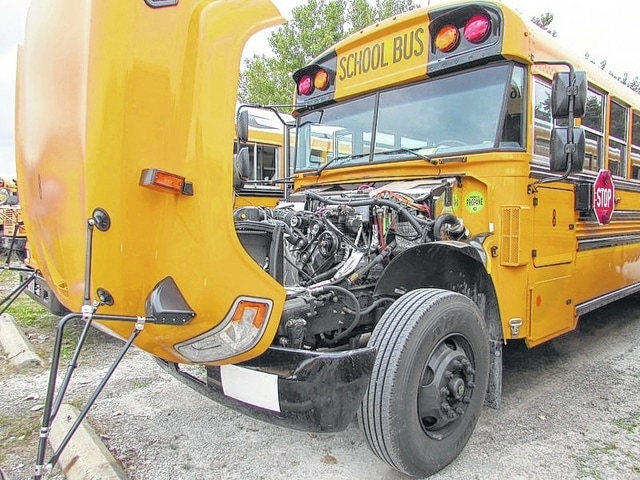

A few buses buzzing around Urbana may seem quieter than in the past.
Urbana City Schools purchased three school buses – two traditional and one handicapped – this year that run on propane, dubbed a cleaner and quieter alternative to the standard diesel school bus. The buses, which cost approximately $90,000 each, are a few thousand dollars more expensive than diesel buses, Urbana Transportation Services Director Dan Leiker said.
The district looked into propane as an alternative for a cleaner option, Leiker said. District officials thought having buses that are more energy efficient would pair well with the new energy-efficient school buildings to be constructed in the coming years.
“Other than natural gas, propane is the cleanest burning fuel out there,” he said.
Though the gas mileage with propane buses is estimated at slightly less than diesel, the fuel burns cleaner and the buses require less additional fuel maintenance, Leiker said. For example, a diesel bus needs special additives in the fuel tank per government regulations to make it run cleaner, and propane does not need that. Oil in a diesel bus is almost instantly dirty when changed, but a propane bus’s oil stays cleaner for longer. And, a diesel engine needs more oil than a propane one, he said.
Leiker added the per gallon cost of propane is cheaper than diesel – approximately $1.14 a gallon versus $2.49 a gallon for diesel. The district works with Heritage Cooperative to fuel both its diesel and propane needs.
Bus drivers and students have noticed a difference.
“I’m amazed at how quiet it is,” said 35-year bus driving veteran Margaret Huffman, one of the drivers using the new propane buses. She said the students who ride on her bus tend to talk more softly since it is quieter during their bus ride.
Huffman added the propane buses drive a little differently. She said they feel like they accelerate differently, more like a car than a truck.
The propane buses also start up sooner and do not need to be plugged into a block heater in the winter, which should save some money for the district in the years to come.
“I want to be able to show that these will be more cost effective in the long run,” Leiker said.



